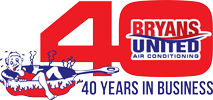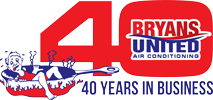During a heavy downpour, the Mississippi River breaks banks, and flooding is inevitable in Gretna, LA, and the surrounding areas. The floodwaters bring destruction to many household items, including your HVAC system. In this article, you’ll learn if it’s necessary to repair or replace a heating and cooling system after a flood.
Furnace
The furnace is the most affected component of an HVAC system after a flood. Due to varying salinity, it’s never possible to determine the extent of the damage until you have an expert inspection done. Salty water is a catalyst for corrosion, making the situation even more uncertain.
Furnaces rely on the combustion of natural gas or other fuels to replace cold indoor air with warm air. The entire process becomes compromised and risky whenever cracks or holes occur in the system. For example, there may be an insufficient oxygen supply leading to the emission of carbon monoxide.
Water presence can damage or destroy the heat exchanger, burners, and coils. The damage also poses the emission of toxic gases. Therefore, before you switch on your furnace after a flood, let an HVAC technician thoroughly inspect it.
When the damage is minor, cleaning the coils and replacing simple components will restore the functionality of your system. However, if the damage is extreme, you may need to replace the entire system to avoid safety risks.
Ductwork
Your ductwork faces many risks during a flood, from damage to harboring harmful biological growth. The extent varies based on the water level. When the water level is little, minor repairs and cleaning will correct the problem. Otherwise, you may be faced with replacing the entire system.
When the water level is low and doesn’t reach the ducts, your ductwork should be functional and useable. However, you must make a few adjustments, including cleaning and replacing the surrounding insulation. This action helps to ensure you don’t harbor toxic pathogens, which will impact the quality of your indoor air.
If the floodwaters completely submerge the ducts, your only choice is a replacement. Again, the main reason is the ducts could be hiding harmful contaminants that could lead to several health problems. Unfortunately, no method can help salvage the vents in this situation.
The AC
An air conditioner has indoor and outdoor components simultaneously delivering quality indoor cooling power. However, flooding has varied consequences in these parts, depending on the water level. For these reasons, ensure your HVAC technician inspects the system before you turn it on.
The electrical wiring architecture has the most considerable effect after flooding. While the outdoor components withstand typical weather, submersion causes the seal to break. Consequently, water enters the fan and short-circuits the motor, rendering the AC inoperable.
When the floods are so intense, coupled with hurricane winds, they may cause a repositioning of the refrigerant system. Consequently, a breach in this system causes refrigerant leaks. Unfortunately, only a certified HVAC technician can correct this problem.
Your AC can function after a flood. However, its life will be short-lived with constant repairs. The best measure is to replace it for better efficiency, indoor air quality, and energy savings.
Heat Pump
A heat pump behaves similarly to an AC after flooding. The electrical components tend to short-circuit and cause corrosion to their wiring. It’s better to replace your heat pump after a flood than engage in unending repairs.
What to Do After Flooding
- Contact your HVAC technician immediately
- Take all necessary precautions (turn off the system if it’s safe)
- Allow the HVAC technician to test the system
- Let the technician discard any contaminated materials
- Clean, disinfect and dry system surfaces (with direction from the technician)
- Replace all insulation
Flooding is a natural disaster that strikes predominantly in areas close to water bodies, such as the Mississippi River. If you fear a recent flood might have damaged your HVAC system, contact Bryans United Air Conditioning for HVAC repair and maintenance, commercial installations, heating, and AC services. Since 1981, our loyal customers have trusted us to provide top-rated service and state-of-the-art technology.
Image provided by iStock


